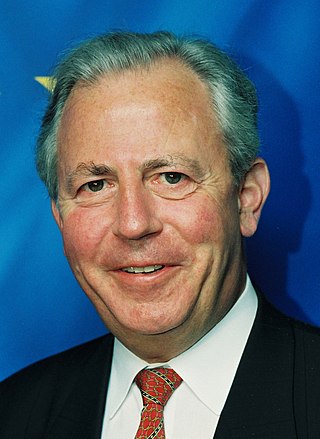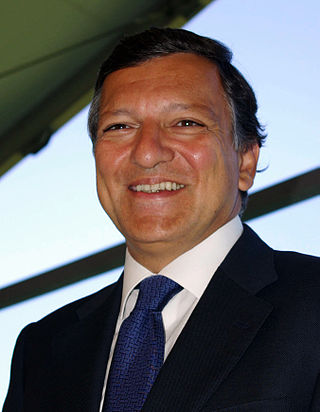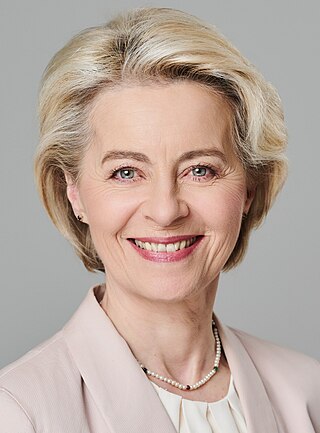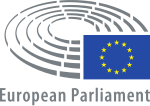
The European Parliament (EP) is one of the legislative bodies of the European Union and one of its seven institutions. Together with the Council of the European Union, it adopts European legislation, following a proposal by the European Commission. The Parliament is composed of 705 members (MEPs), due to rise to 720 after the June 2024 European elections. It represents the second-largest democratic electorate in the world, with an electorate of 375 million eligible voters in 2009.

The president of the European Commission is the head of the European Commission, the executive branch of the European Union (EU). The president of the commission leads a cabinet of commissioners, referred to as the college. The president is empowered to allocate portfolios among, reshuffle, or dismiss commissioners as necessary. The college directs the commission's civil service, sets the policy agenda and determines the legislative proposals it produces. The commission is the only body that can propose or draft bills to become EU laws.

A member of the European Parliament (MEP) is a person who has been elected to serve as a popular representative in the European Parliament.
The June Movement was a Danish Eurosceptic political organisation founded 23 August 1992. It took its name from the referendum on the Maastricht Treaty that took place in Denmark in June of that year. The movement was a member of the European political party EUDemocrats - Alliance for a Europe of Democracies.

Richard Graham Corbett CBE is a former British politician who served as the final Leader of the European Parliamentary Labour Party (EPLP), from 2017 to 2020.

Diana Paulette Wallis, is a British former Liberal Democrat Member of the European Parliament (MEP) for Yorkshire and the Humber. Wallis was first elected in 1999 and re-elected in 2004 and in 2009. She resigned her seat in January 2012 and went on to pursue academic, legal and mediation-related activities.

Independence/Democracy (IND/DEM) was a Eurosceptic political group active during the 2004–2009 term of the European Parliament. The group was the successor to the Europe of Democracies and Diversities (EDD) group.

The Santer Commission was the European Commission in office between 23 January 1995 and 15 March 1999. The administration was led by Jacques Santer.

The Barroso Commission was the European Commission in office from 22 November 2004 until 31 October 2014. Its president was José Durão Barroso, who presided over 27 other commissioners. On 16 September 2009 Barroso was re-elected by the European Parliament for a further five years and his Commission was approved to take office on 9 February 2010.

Daniel Caspary is a German politician who has been serving as a Member of the European Parliament (MEP) since 2004. He is a member of the Christian Democratic Union (CDU), part of the European People's Party (EPP). Daniel Caspary is now in the fourth legislature of the European Parliament. Daniel Caspary lives in Weingarten. He is married and has five children.

The apportionment of seats within the European Parliament to each member state of the European Union is set out by the EU treaties. According to European Union treaties, the distribution of seats is "degressively proportional" to the population of the member states, with negotiations and agreements between member states playing a role. Thus the allocation of seats is not strictly proportional to the size of a state's population, nor does it reflect any other automatically triggered or fixed mathematical formula. The process can be compared to the composition of the electoral college used to elect the President of the United States of America in that, pro rata, the smaller state received more places in the electoral college than the more populous states.
Parliamentary informatics is the application of information technology to the documentation of legislative activity. The principal areas of concern are the provision, in a form conveniently readable to humans or machines, of information and statistics about:
The seven institutions of the European Union (EU) are seated in four different cities, which are Brussels (Belgium), Frankfurt am Main (Germany), Luxembourg (Luxembourg) and Strasbourg (France), rather than being concentrated in a single capital city. All four were chosen, among various reasons, for their location halfway between France and Germany, the countries whose rivalry led to two World Wars and whose reconciliation paved the way for European integration. The EU agencies and other bodies are located all across the union, but usually not fixed in the treaties. The Hague is the only exception, as the fixed seat of the Agency for Law Enforcement Cooperation (Europol). Luxembourg City is the EU capital that can lay claim to having the most of the seven EU institutions based wholly or partly upon its territory, with only the European Council and European Central Bank not having a presence in the city. Over the years, Brussels has become the EU's political hub, with the College of the Commissioners – the European Commission's politically accountable executive – and the European Council both meeting at their Brussels-based headquarters, and the European Parliament and Council of the EU holding the majority of their meetings annually within the city. This has led media to describe it as the de facto "capital of the EU".

The Espace Léopold or Leopoldruimte is the complex of parliament buildings in Brussels, Belgium, housing the European Parliament, a legislative chamber of the European Union (EU). It consists of a number of buildings, primarily the oldest, the Paul-Henri Spaak building, which houses the debating chamber and the President's offices, and the Altiero Spinelli building, which is the largest. The buildings are located in the European Quarter of Brussels, with construction starting in 1989.

The national parliaments of the European Union are those legislatures responsible for each member state of the European Union (EU). They have a certain degree of institutionalised influence which was expanded under the Treaty of Lisbon to include greater ability to scrutinise proposed European Union law.

The European Union (EU) uses a number of symbols, including the Flag of Europe, Anthem of Europe, Motto of the European Union and Europe Day.

The Treaty of Lisbon is an international agreement that amends the two treaties which form the constitutional basis of the European Union (EU). The Treaty of Lisbon, which was signed by all EU member states on 13 December 2007, entered into force on 1 December 2009. It amends the Maastricht Treaty (1992), known in updated form as the Treaty on European Union (2007) or TEU, as well as the Treaty of Rome (1957), known in updated form as the Treaty on the Functioning of the European Union (2007) or TFEU. It also amends the attached treaty protocols as well as the Treaty establishing the European Atomic Energy Community (EURATOM).

The history of the European Union from 2004 to the present is the current timeline of the European Union. It is a period of significant upheaval and reform following the 2004 enlargement of the European Union. The EU has taken on ten new members, eight of which were initially much poorer than the EU average, and took in a further two in 2007 with many more on the way. It created the euro a few years before and had to expand this, and the Schengen Area to its new members. However this was overshadowed by the late-2000s recession and damaging disputes over the European Constitution and its successor, the Treaty of Lisbon. Throughout this period, the European People's Party has been the largest group in the European Parliament and provides every President of the European Commission.

The ninth European Parliament was elected during the 2019 elections and is slated to remain in session until the forthcoming 2024 elections.

The 2024 European Parliament election is scheduled to be held from 6 to 9 June. This will be the tenth parliamentary election since the first direct elections in 1979, and the first European Parliament election after Brexit. This election will also coincide with a number of other elections in some European Union member states.


















